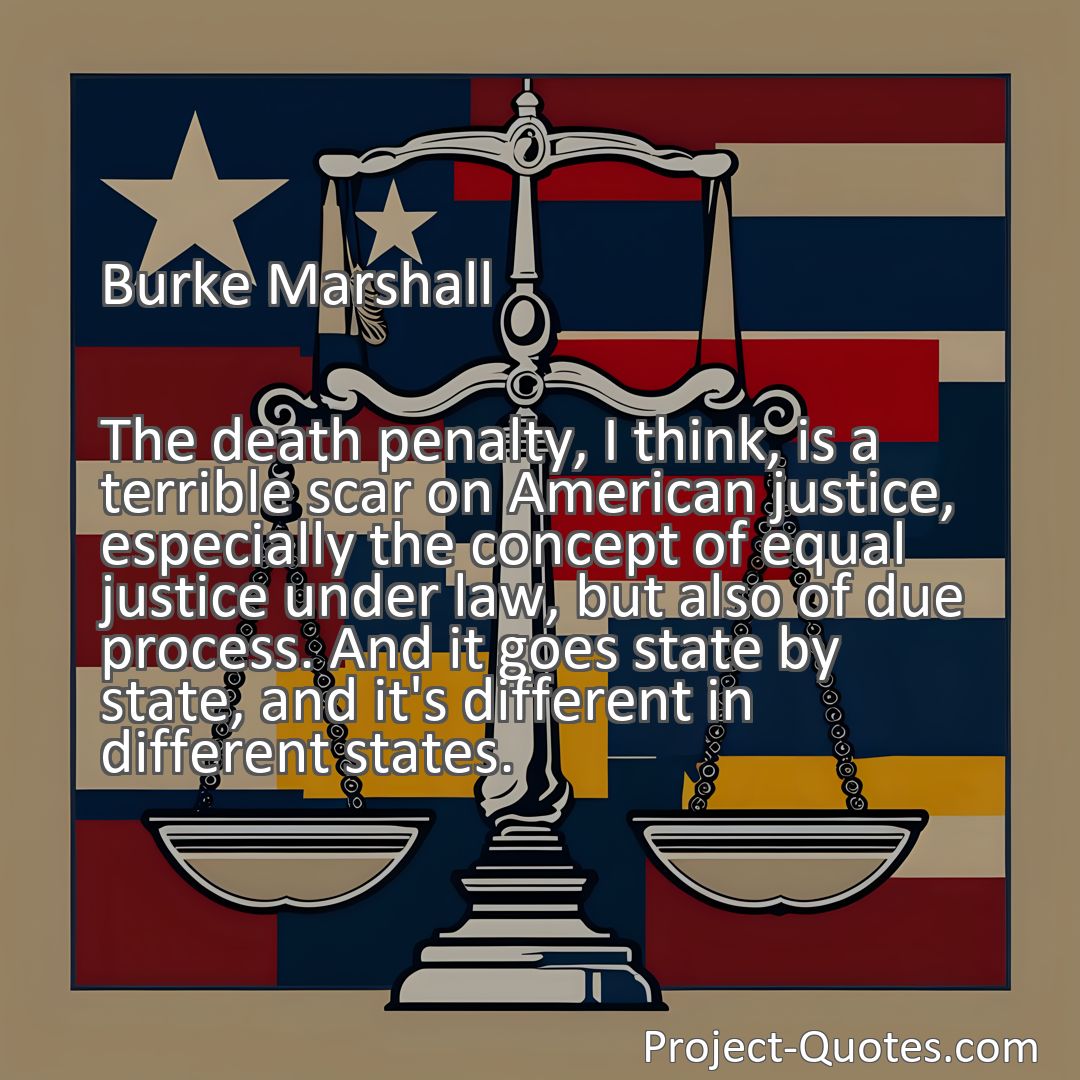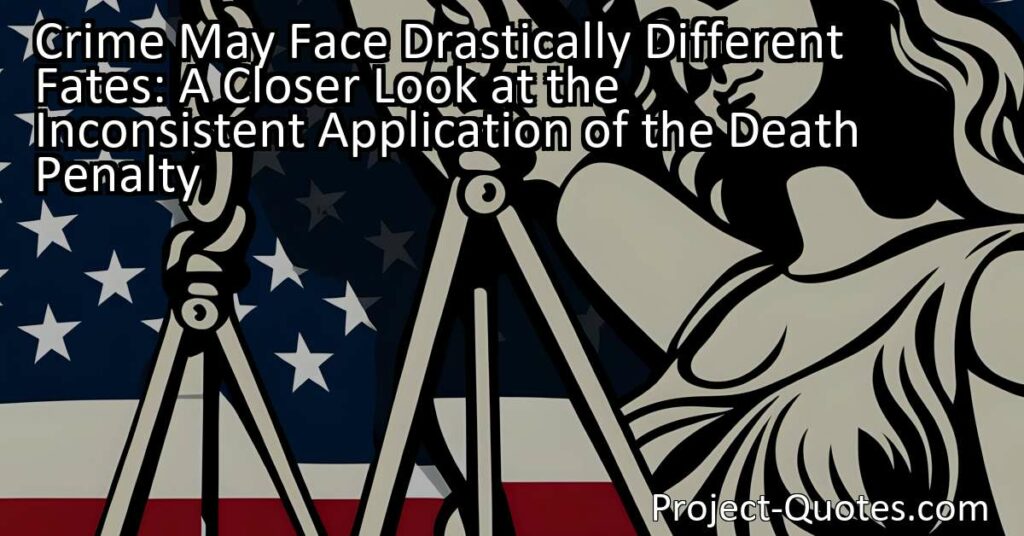The death penalty, I think, is a terrible scar on American justice, especially the concept of equal justice under law, but also of due process. And it goes state by state, and it’s different in different states.
Burke Marshall
The death penalty, a controversial and divisive practice, is applied inconsistently among different states in the United States. This inconsistency raises concerns about the fairness and equal treatment under the law, as individuals convicted of the same crime may face drastically different fates solely based on their jurisdiction. Moreover, the risk of executing innocent people challenges the principle of due process, and the high cost associated with capital punishment limits resources for other essential areas. It is essential for the United States to reevaluate its approach to the death penalty and work towards a standardized nationwide standard.
Table of Contents
- 1 The death penalty, I think, is a terrible scar on American justice, especially the concept of equal justice under law, but also of due process. And it goes state by state, and it’s different in different states.
- 2 Burke Marshall
- 3 Meaning of Quote – The death penalty, I think, is a terrible scar on American justice, especially the concept of equal justice under law, but also of due process. And it goes state by state, and it’s different in different states.
- 4 Freely Shareable Quote Image
- 5 Related
Meaning of Quote – The death penalty, I think, is a terrible scar on American justice, especially the concept of equal justice under law, but also of due process. And it goes state by state, and it’s different in different states.
The death penalty, a practice that has sparked intense debates and raised ethical concerns for centuries, is the subject of Burke Marshall’s quote. The former Assistant Attorney General, known for his dedication to civil rights and justice, criticizes the death penalty, describing it as a “terrible scar on American justice, especially the concept of equal justice under law, but also of due process.” Marshall highlights the inconsistency in its application among different states, emphasizing the need for a nationwide approach to this controversial issue.
Since the early days of civilization, societies have grappled with the question of how to administer justice when a crime results in the loss of human life. The death penalty, also known as capital punishment, has emerged as one of the most extreme measures implemented to punish offenders. Proponents argue that it serves as a deterrent, ensures justice for victims’ families, and removes dangerous individuals from society. On the other hand, opponents raise various concerns about its morality, efficacy, and the possibility of erroneous convictions.
Marshall raises two key points in his quote: the violation of equal justice under law and the issue of due process. The concept of equal justice under law forms the backbone of a fair and impartial legal system. It insists that every individual, regardless of their race, religion, social status, or any other characteristic, receives equal treatment before the law. However, when it comes to the death penalty, this principle is often compromised due to disparities in its implementation across states.
Each state in the United States has its own laws and procedures regarding capital punishment. This leads to a lack of uniformity, as the application of the death penalty varies significantly from one state to another. Discrepancies arise in the types of crimes that are punishable by death, the methods used for execution, and the overall frequency of imposing this ultimate punishment. As a consequence, individuals convicted of the same crime may face drastically different fates depending solely on the jurisdiction in which they are tried.
Such inconsistency raises concerns about the fairness and impartiality of our justice system. It undermines the value of equal justice under law, creating a perception that justice is contingent on geographical location. This taints the credibility of the legal system and undermines public trust in the fairness of capital punishment. It is crucial for the United States to address this issue by working towards a standardized approach to the death penalty nationwide.
Furthermore, Marshall points out that the death penalty diminishes the concept of due process. Due process, a fundamental pillar of democratic societies, ensures that individuals facing allegations have the right to a fair and just legal proceeding. This principle includes the right to legal counsel, the right to present evidence, and the opportunity to challenge the accusations brought against them. However, capital punishment poses significant challenges to upholding due process.
In cases where the death penalty is sought, the stakes are incredibly high, and the margin for error is slim to none. A wrongful conviction resulting in the execution of an innocent person is an irreversible and irrevocable mistake. History is riddled with examples of such tragic errors, where individuals were later found to be innocent through new evidence, DNA testing, or confessions from the real perpetrators. The risk of executing an innocent person challenges the very essence of due process and undermines the integrity of the legal system.
Moreover, the cost associated with capital punishment further complicates the issue of due process. Implementing the death penalty involves exhaustive legal proceedings, which can stretch over years and even decades. Defense attorneys are obligated to utilize all possible avenues to prevent the execution of their clients, thus adding to the financial burden on both state and federal budgets. These exorbitant costs limit the resources available for other essential areas such as education, healthcare, and social welfare. Therefore, the death penalty indirectly infringes on citizens’ right to a robust and well-functioning justice system that serves their broader needs.
While the fight against capital punishment continues, progress is being made. Many states have already abolished the death penalty, recognizing its inherent flaws and inconsistencies. Their decision to opt for alternative measures, such as life imprisonment without parole, demonstrates an evolving understanding of justice and a commitment to protect the due process rights of all individuals. Moreover, the increasing prevalence of new evidence exonerating individuals previously subjected to capital punishment serves as a wake-up call for reevaluating our system.
In conclusion, Burke Marshall aptly describes the death penalty as a terrible scar on American justice. The inconsistent application of the death penalty among different states undermines the concept of equal justice under law, while the risk of executing an innocent person challenges the very essence of due process. It is crucial for the United States to reevaluate its approach to capital punishment, working towards a nationwide standard that adheres to the principles of fairness, consistency, and the protection of the rights of all individuals involved. Only then can we begin to heal the wounds inflicted by this controversial practice and move toward a more just and humane justice system.
I hope this quote inspired image brings you hope and peace. Share it with someone who needs it today!


